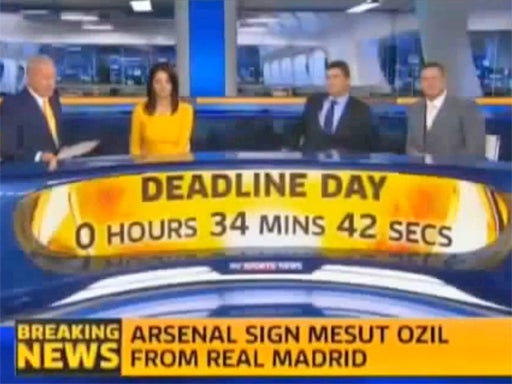Ian Herbert: Sky Sports reports, Sky Bet reacts – is there a conflict of interest?
Sky Bet is the only bookie with a sister company that can move the market

All part of the turf for a Rupert Murdoch company perhaps, but Sky Sports certainly endures a lot of cynicism for a sports network which has done so much to transform the quality of football broadcasting. One of the more insane rumours doing the rounds last week was that Sky had been deliberately attempting to force Gareth Bale's move to Real Madrid because it would limit BT Sport's access to a player they are paying handsomely to be a brand ambassador. But the volume of responses to the observation, briefly raised in this column last week, that people are uneasy about the relationship between Sky Sports and Sky Bet suggests that they do have some explaining to do.
The pattern which unsettles so many people runs thus: Sky runs a story. Sky Bet pops up with the odds on screen or on Sky's Twitter feed. Punters throw money at the story. Sky Bet cuts the odds. And then Sky says the story has evaporated. Or, as someone put it on Twitter last week: "Oi @SkySportsNews, how much money did @SkyBet just make after you reported Man Utd wanted Mesut Ozil?"
There is no suggestion that Sky Bet was attempting to profit from that Ozil story or any other. The BBC and some newspapers were also suggesting on transfer deadline day that Ozil was in United's sights – when the club had actually rejected an offer to buy the German weeks earlier. But the potential for a conflict of interest plainly exists because Sky Bet is the only bookmaker with a sister company which has the potential to influence and move the betting market. Sky Sports News does that all the time, though there is no suggestion that they do this knowingly for financial gain.
Sky Sports' internal rules are actually far more exacting than some might realise. For example, any Sky journalist found to be betting as a result of information received in the course of work would be subject to disciplinary action. That's more stringent than the BBC – which has no specific guidelines on that conduct, though which says it could be seen as a conflict of interest – and arguably more so than The Independent, whose code of conduct compels its journalists to prevent any situation arising which is – or could be perceived as being – a conflict of interest. "The perception… can be as damaging as the reality," states the code.
And the part of Ofcom's code preventing broadcasters giving undue promotion to commercial products – which can bring six-figure fines – means that Sky does not venture into territory through which newspapers happily skip. Those "sponsored" player interviews, carried in the print media with crude promotional taglines, are passed up by Sky because they fall foul of Ofcom's test.
Yet the scepticism will remain for as long as this dubious betting market for player and managerial moves exists, with all the opportunities it provides. There are more opportunities than some imagine: embargoed stories from the Press Association, for example, provide advance information in good enough time to bet.
Journalists are inevitably the ones the public will be incensed about, but the potential financial gain is immeasurably greater for players, managers, their families and friends. It's seven years now since the Football Association investigated whether anyone close to Harry Redknapp might have profited from his re-appointment at Portsmouth, where bets on him taking the job – which he did – reached as high as £25,000 at odds of 2-5. Though Redknapp was not found to have gained financially, the betting movements are always a prime indicator of which manager is moving where.
The former FA chairman Lord Triesman declared during his tenure that he wanted a blanket ban on betting on football by players, managers and officials, in an attempt to end any ambiguity and protect the integrity of English football. That eminently wise notion seems like ancient history now, in a sport which permits players to bet on leagues and competitions other than their own – as if anyone really thinks that they are not privy to inside information from contacts or former team-mates; a sport which is rampantly promoting bookmakers in return for a cut of their money, irrespective of the abundance of gambling addicts within the game, whose debts make them a potential target for criminal syndicates. We're inured to the insidious relationship between football and the gambling industry. The FA and Premier League both have betting partners. The Football League has re-named itself after one.
The Sky conspiracies are still out there. A Liverpool forum forwards the idea that Willian to Anfield might have been promoted by the network to make the odds on his eventual move to Chelsea more attractive. More proof that Sky's decision to run a betting firm as well as a news business has done its journalists no favours. But there are many more reasons to feel cynical about a sport up to its neck in the gambling business.
Join our commenting forum
Join thought-provoking conversations, follow other Independent readers and see their replies
Comments